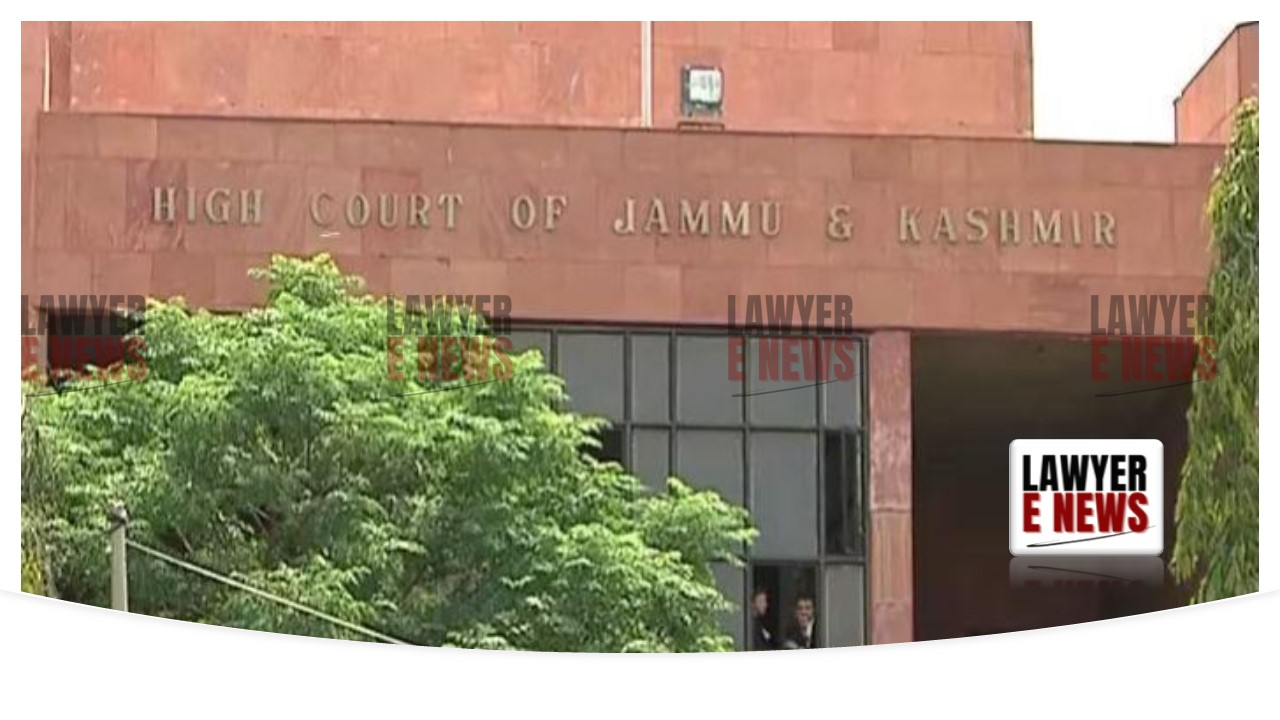-
by Admin
15 February 2026 2:36 AM



High Court of Jammu & Kashmir and Ladakh delivered a significant judgment in three consolidated service writ petitions , quashing the punishments imposed by the Summary Security Force Court (SSFC) on Border Security Force (BSF) personnel. The Court, presided over by Hon’ble Justice Vinod Chatterji Koul, ruled that the SSFC acted without jurisdiction in trying civil offences under Section 46 of the Border Security Force Act, 1968 (BSF Act) and held that the punishments of dismissal from service and imprisonment were a nullity in law.
The petitioners, former BSF personnel, were dismissed from service and sentenced to 12 months' imprisonment for allegedly remitting bank drafts disproportionate to their known sources of income, purportedly violating Section 46 of the BSF Act read with Section 13(e) of the Prevention of Corruption Act, 1988.
“SSFC Lacks Jurisdiction to Try Civil Offences Beyond Simple Hurt and Theft”
The Court held that the SSFC, as per Rule 47 of the Border Security Force Rules, 1969 (BSF Rules), is empowered to try only specific civil offences, such as simple hurt and theft. Justice Koul stated:
"An offence under Section 46 of the BSF Act read with Section 13(e) of the Prevention of Corruption Act cannot be tried summarily under Rule 47. The SSFC lacks jurisdiction to deal with civil offences beyond the limited scope prescribed under the BSF Act and Rules."
The judgment referred to the precedent established in Sumanta Dutta v. Union of India (SWP No. 135/2005), where the High Court had previously ruled that SSFC’s jurisdiction to try civil offences under Section 46 is restricted to simple hurt and theft.
Procedural Violations: “Right to a Proper Inquiry and Natural Justice Violated”
The Court also noted that the proceedings leading to the punishments were marked by serious procedural lapses, including the failure to conduct a proper inquiry and denial of the petitioners’ right to be heard. The judgment stated:
"The respondents failed to comply with the procedural safeguards mandated by the BSF Act and Rules. The petitioners were neither afforded an opportunity to be heard nor was any inquiry conducted to establish the source of the funds they allegedly remitted."
It further highlighted that the allegations of possessing disproportionate assets were not supported by any credible evidence, and there was no complaint or allegation of the petitioners misappropriating government funds, taking bribes, or engaging in misconduct.
Reinstatement Ordered with Conditional Back Wages
The High Court quashed the dismissal orders and directed the reinstatement of the petitioners in service. Regarding back wages, the Court ruled:
"The payment of back wages shall depend on whether the respondents choose to prosecute the petitioners further. If no prosecution is initiated, the petitioners shall be entitled to full back wages from the date of dismissal until reinstatement."
This conditional approach balances the petitioners’ reinstatement with the possibility of further legal action by the BSF authorities, should they choose to initiate proper proceedings under applicable laws.
Judicial Precedent: Reliance on Sumanta Dutta v. Union of India
The Court relied heavily on the principles laid down in Sumanta Dutta v. Union of India, a case with similar facts, where the SSFC’s jurisdiction to try civil offences under Section 46 of the BSF Act was held to be limited. Quoting extensively from the earlier judgment, the Court reaffirmed:
"The Summary Security Force Court was not competent and lacked jurisdiction to try ‘civil offences’ under Section 46 of the BSF Act except for simple hurt or theft. The punishments imposed by the SSFC in such cases cannot be sustained in law."
Key Takeaways from the Judgment
1. SSFC’s Limited Jurisdiction: The SSFC is restricted to trying specific civil offences (e.g., simple hurt and theft) under Section 46 of the BSF Act. It cannot try offences under other laws, such as the Prevention of Corruption Act.
2. Natural Justice and Procedural Safeguards: Any disciplinary action must comply with procedural requirements under the BSF Act and Rules, including conducting a proper inquiry and ensuring the right to be heard.
3. Conditional Reinstatement and Back Wages: Reinstatement with conditional back wages provides a fair remedy while allowing the BSF authorities to pursue further legal action if deemed necessary.
4. Precedential Value: This judgment reinforces the High Court’s earlier rulings on the SSFC’s jurisdiction, ensuring consistent application of the BSF Act and Rules.
Implications for BSF Disciplinary Mechanisms
This ruling has far-reaching implications for disciplinary actions within the BSF and other paramilitary forces. It emphasizes the need for adherence to jurisdictional limits and procedural safeguards in courts of inquiry and summary proceedings. By affirming that SSFC cannot overreach its statutory jurisdiction, the judgment ensures that disciplinary mechanisms remain fair and legally sound.
Date of Decision: November 19, 2024
